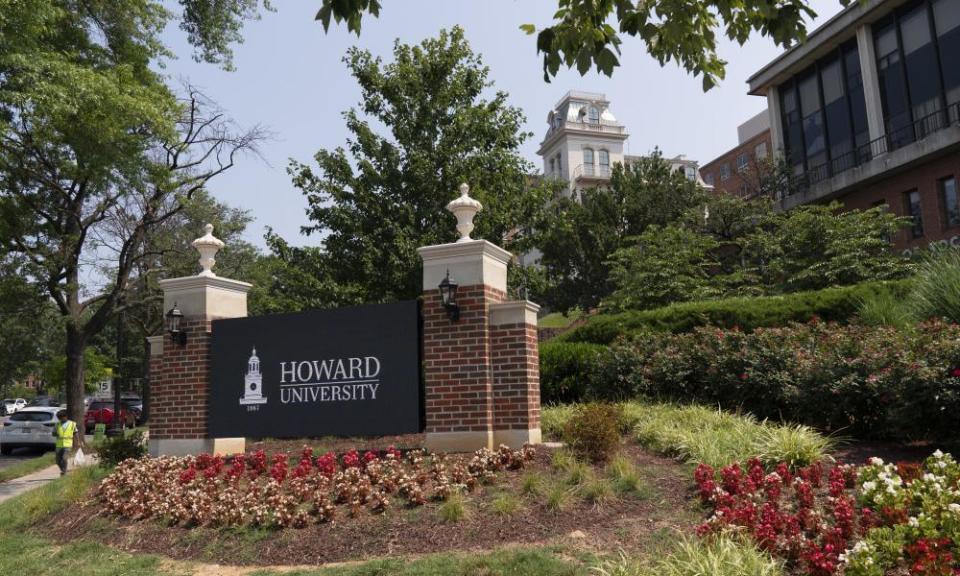Rats, mold, roaches: Howard students stage sit-in over housing conditions

Mold. Rats. Cockroaches. Mushrooms growing under the sink. For undergraduate students attending Howard University, a historically Black college in Washington, these and other conditions have prompted students to protest, staging a sit-in and sleeping at the university’s main student center for the past two weeks.
Organizing on social media apps like Instagram and TikTok under the #Blackburntakeover, as many as 150 students have been staging a sit-in at Howard’s Blackburn University Center, described as the “social hub of the university” by Howard.
Related: Fox News’s Neil Cavuto ‘begs’ viewers to ‘stop the politics’ and get Covid vaccine
Since 12 October they have protested what they describe as deplorable housing conditions, including mold on expired air filters, rat and cockroach infestations, and mushrooms blooming on dorm room ceilings and under sink despite on-campus housing costing upwards of $12,000 a year.
Students, chronicling the sit-in with the Instagram account “The Live Movement”, are also sleeping at the center in protest and say they will not leave until their demands are met.
“[Sleeping] outside and in the Blackburn center has been nicer than a lot of our dorms,” said Nikkya, 18, and freshman at Howard University and sit-in participant.
Student organizers have been using the student center to launch mutual aid efforts, feeding Howard University students for free, providing free hair cuts and hosting yoga sessions.
The group’s demands center on concrete plans from the university to address housing woes and solutions to issues around transparency. They want an in-person town hall with Howard’s president Wayne A I Frederick, a permanent reinstatement of all affiliate positions on Howard’s board of trustees, a meeting with student leadership to outline plans addressing housing-related issues, as well as immunity – legal, disciplinary, and academic – for protesting students as participants have received threats of expulsion and other punishment for their participation.
Despite a recent wave of funding to the university, including a $40m donation from philanthropist MacKenzie Scott, and and a multimillion dollar yearly endowment – $647m as reported in 2017, Howard has publicly struggled with housing for its DC-located students, particularly following an enrollment surge this year.
In addition to blighted on-campus housing, sit-in participants say that upperclassmen, third and fourth year students, struggle to find off campus housing in the DC area, where the average rent for a studio apartment is $1,843, a nearly 7% increase from last year.
“It’s incredible that with the amount of money Howard University receives each year, whether it be from the government, tuition, fees, or donations, we still have buildings that haven’t been up to date in years,” said Eja, 18, a freshman at Howard and protest participant.
Students dealing with unhealthy housing conditions say their complaints have been met with what they have coined as the “Howard run-in”, a chronic bureaucracy problem that students say make it difficult to access campus resources for everything from housing to financial aid to appointments at Howard’s health center.
Even when fixes have been made, students allege that solutions have been incomplete. According to Jasmine, 19, many students have had health consequences because of issues like mold in the housing. Jasmine and Eja, who has asthma, both say they have been sick for most of the first semester, unsure what the issue is before discovering mold and liquid leaking through their ceiling as the likely source of their illnesses.
“I’ve been sick for like a month and a half due to my air filter not being properly cleaned to the point where we thought it could’ve been Covid,” said Jasmine.
The protests have received widespread support from a number of influential allies such as president and CEO of the NAACP Derrick Johnson, Bernice King, and Gucci Mane who pulled out performing at Howard’s homecoming in solidarity with protesters.
But they have been met with hostility from university officials. Emails from Howard University officials such as Howard vice-president of student affairs Cynthia Evers have also threatened to punish students who participate in the sit-in, including with expulsion.
Progress stalled further when students, attempting to host a town hall with university officials on Tuesday night, were met with police who were dispatched to remove protestors from the center. While no students have been arrested, Nikkya noted that some police have been aggressive, with mostly male officers walking through sleeping spaces with mostly women protests despite alternative hallways.
Howard University officials could not be reached for comment. Corvias Property Management, who Howard University is currently in partnership with for housing, defended its record.
“A recent inspection discovered mold in less than a tenth of a 1% of rooms – 34 out of 3,300. We encourage students to report service needs as soon as possible by contacting the front desk attendant, by phone or online,” a spokesperson said.
But protesting students are unlikely to be satisfied with that response.
“We hope no other future Howard class has to protest and sit in like we have,” said Jasmine, noting Howard’s long history of student protest regarding issues on campus.

 Yahoo Finance
Yahoo Finance 